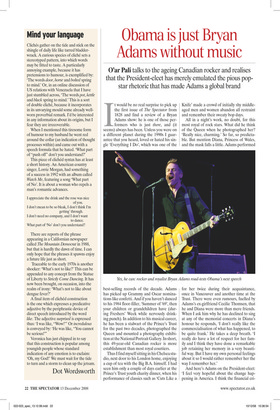Mind your language
Clichés gather on the tide and stick on the shingle of daily life like tarred bladderwrack. A curious species of cliché sets a stereotyped pattern, into which words may be fitted to taste. A particularly annoying example, because it has pretensions to humour, is exemplified by: ‘The words door, horse and bolted spring to mind.’ Or, in an online discussion of US relations with Venezuela that I have just stumbled across, ‘The words pot, kettle and black spring to mind.’ This is a sort of double cliché, because it incorporates in its unvarying mould some already wellworn proverbial remark. I’d be interested in any information about its origins, but I fear they are irrecoverable.
When I mentioned this tiresome form of humour to my husband he went red around the collar (an indication of thought processes within) and came out with a speech formula that he hated. ‘What part of “push off” don’t you understand?’ This piece of clichéd syntax has at least a short history. An American country singer, Lorrie Morgan, had something of a success in 1992 with an album called Watch Me, featuring a song ‘What part of No’. It is about a woman who repels a man’s romantic advances.
There are reports of the phrase appearing in a Californian newspaper called The Mountain Democrat in 1988, but that is hardly the dawn of time. I can only hope that the phrases it spawns enjoy a future life just as short.
Traceable to the early 1970s is another shocker: ‘What’s not to like?’ This can be appended to any concept from the Statue of Liberty to Strictly Come Dancing. It has now been brought, on occasion, into the realm of irony: ‘What’s not to like about dengue fever?’ A final item of clichéd construction is the one which expresses a predicative adjective by the periphrastic device of direct speech introduced by the word like. The adjective surprised is expressed thus: ‘I was like, “Wow!”’ Or incredulous is conveyed by: ‘He was like, “You cannot be serious!”’ Veronica has just chipped in to say that this construction is popular among youngish people whose standard indication of any emotion is to exclaim: ‘Oh, my God!’ We must wait for the tide to turn and a storm to clean up the jetsam.
Dot Wordsworth










































































 Previous page
Previous page